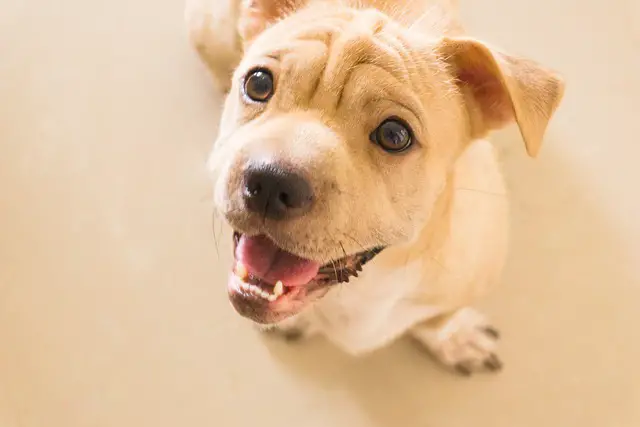If you are wondering ‘Why is my dog growling at nothing’ then the causes can range from an illness to dog aggression. Sometimes, dogs hear something which we humans can’t and they may growl due to that.
My dog often growls every morning at a particular time, in the terrace. I always account it to the fact that she hears or sees a neighborhood dog walk by. Sometimes, she even growls while playing.
In short, there are different types of dog growling.
Let us find out: ‘Why is my dog growling at nothing’ and also consider ways to discipline a dog that growls.
Why is my Dog Growling at Nothing?
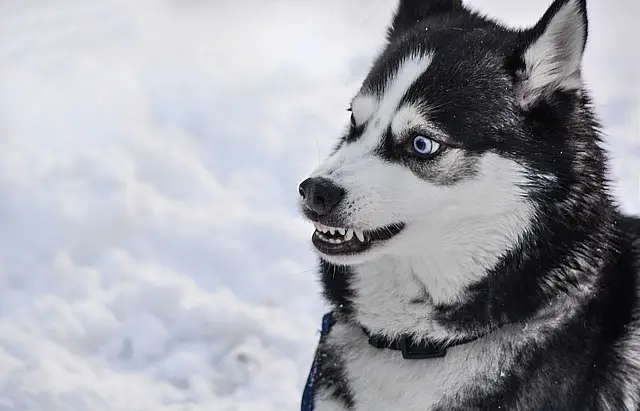
Dogs might growl at nothing due to numerous reasons:
1. Superior hearing
Dogs are gifted with superior hearing. They can hear frequencies which human ears cannot decipher. If your dog appears to be growling at nothing, then chances are that it hears something which is beyond the range of normal human hearing. It could be some frequency emitted by machines or planes or even seismic tremors.
If your dog’s growling continues for a long period of time, please see a vet.
2. Superior eyesight
Some dogs also have far superior eyesight than humans. Your dog might see something which you cannot. That is also one of the answers to ‘why is my dog growling at nothing?’ Often, dogs with high prey drive might also growl when they see squirrels, small animals, etc.
3. Health issue
A dog in pain might also growl from time to time. Of course, growling isn’t a normal way of communicating pain or discomfort. Most dogs will whine instead of growl. Therefore, always ensure your dog is healthy and safe. If the growling continues, it could simply be aggression, boredom, or other dog behavior issue.
4. Canine cognitive dysfunction
Older dog or senior dog might growl when it starts suffering from CCD or canine cognitive dysfunction. This is a form of dog dementia. An older dog has very little patience. It tires easily and might sleep more. It might not tolerate noisy homes, pets, kids, etc.
An old dog growling is certainly one of the ways in which it might convey many messages to the pet owner. It might be a way of saying: hey, I need some peace. It could also be a way of saying that ‘all isn’t well in my world’.
5. Mode of communication
Dogs use various sounds and barks to communicate with other dogs. Even if your dog appears to be growling at nothing, it could be actually communicating with a fellow dog in the neighborhood. Dogs also use howling, whining, and barking to communicate with one another.
6. Anxiety
A dog with separation anxiety might whine, bark, growl, and whimper all the time. Such dogs are high strung, afraid, and nervous. They may appear to be anxious when left alone or even throughout the day even if the dog owner is by their side. Resultantly, they might growl or whimper to convey their anxiety at being left alone.
7. To warn other pets
Growling could be a dog’s way of showing possessiveness about the pet parent to other dogs or even a warning to human kids to stay away from the dog parent. Such dogs believe that they own the dog parent and may not let anyone else come close. Sometimes, the dog owner might have encouraged this dog behavior unknowingly.
8. Lack of training
Inadequately trained dogs might growl all the time. They may be aggressive or even passive aggressive. Passive aggression is a way of showing that it (the dog) is the ‘alpha’ of the pack.
It might start having its way around the house: entering and exiting the doorways before the dog owner does, laying sprawled about in the path, jumping on beds and furniture despite not being allowed, growling when someone touches their toys, etc.
Such dogs tend to be inadequately trained and might also not be desensitized or socialized to experiences, other dogs, etc.
9. Dog owner might unknowingly encourage it
Has it even happened to you that you wanted your dog to stop doing something and instead of using other methods, you treated it instead?
If your dog growled at nothing, and you wanted it to stop, you may have treated it thinking it will stop. The dog starts thinking: ‘growling is good. I am supposed to keep growling!’ And that may have encouraged the behavior.
What are Different Types of Dog Growling?
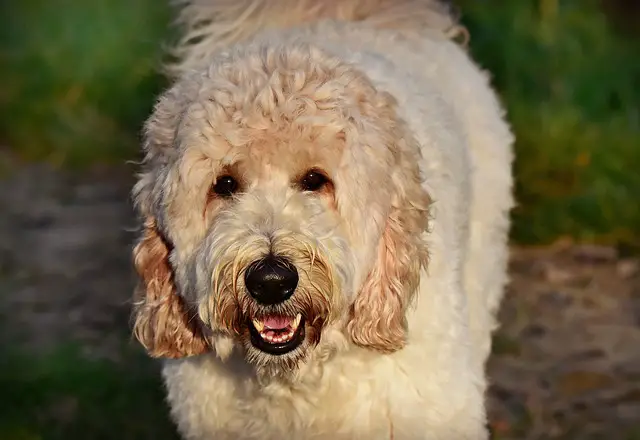
These different types of dog growling will also help you answer the question: ‘why is my dog growling at nothing?’
1. ‘It doesn’t mean anything’ growling
Not all kinds of growling is meant to be a warning or bad news. Dogs communicate in various ways and they might growl in the form or a low rumble that means nothing. A growling dog need not necessarily be angry, aggressive, or even sick. It might just be a bored dog that makes a sound to get attention!
2. Playful growling
My dog does this. When we toss her a toy, she doesn’t fetch it. Instead, she holds it in her mouth. If anyone goes to fetch it from her, she growls. Don’t worry, she does not bite. But it is a playful growling and she even relents after a while and lets us have the toy!
When two doggy friends meet, they too might play growl. In the canine language, it could mean a plethora of things and isn’t necessarily a warning or show of aggression. Mostly, it is an affectionate, playful, and even a dog’s way of having some fun.
3. Pleasure growling
This is a low and loose sound that dogs make when their owner pets them or gives them belly rubs. Sometimes, when you stop petting your dog, it might pleasure growl too – not exactly as a warning – just as a way of getting your attention.
4. Frustration growl
Sometimes, dogs can show their frustration through growling too. For example, you have a treat dispensing box which your dog finds frustrating to open and reach the treats within. Then it might growl and whine to seek its owner’s help.
5. Warning growl
This type of growling is the one to watch out for. For example, a dog might growl at the groomer when they touch its paws for trimming the nails. Dogs can also use this growling around other dogs if they are food aggressive. Typically, this behavior might come from untrained dogs. Dogs that aren’t desensitized from puppy-hood might show food aggression with growling, raised heckles, bared teeth, and even snapping and snarling.
6. Aggression growling
This is the point of no return. An adult dog that growls aggressively is in need of some serious training with the help of a dog trainer or canine behaviorist. Such dogs may not hesitate to bite. Aggression must be controlled from puppyhood. In fact, good training will prevent aggression.
What To Do When Your Dog Growls At You?
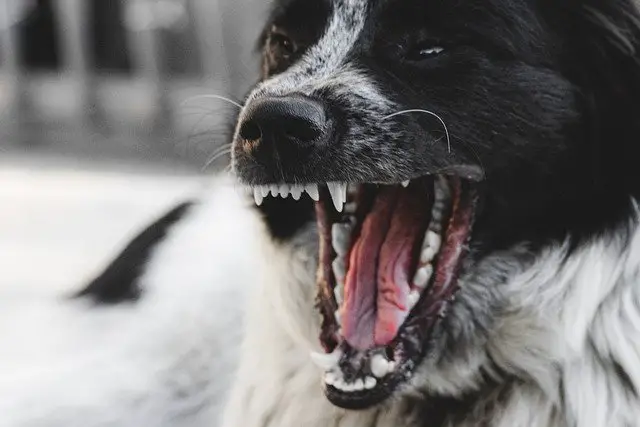
Here are some steps a dog owner can use to deal with a dog that growls at them:
1. Back off
The first thing is your safety. Back off because a dog that growls won’t hesitate to bite.
2. Avoid punishing
Never punish, hit, or scold a dog that growls. That will not serve any purpose and might even make the dog more aggressive, or worse, timid or fearful.
In fact; growling is better since it is a warning that your dog gives before it actually bites. When you punish your dog for growling, the next time, s/he might bite straight away.
3. Understand why your dog growls
By treating the root cause of the problem, you will be in a better position to stop the behavior. Find out why and when your dog growls. Understand that pleasure growling and play-growling are a lot different than resource-guarding growling and food aggression growling.
4. Desensitize your dog
Once you understand why your dog growls, you must desensitize it to those actions. For example, if your dog growls when you groom it, you will have to slowly use positive reinforcement training while grooming.
- Start by stroking your pet. Treat it when it is relaxed.
- Now brush the pet’s head. If it doesn’t growl, say good boy/good girl and treat it.
- Next, groom through its back and continue treating.
- Eventually, you will want to stop treating and only use verbal praise as you desensitize your pet to grooming.
You can repeat similar actions when you take away your dog’s toys, food, etc.
5. Go in for in-depth training
Sometimes, problems like food aggression, territorial aggression, and fear aggression are best solved with the help of an experienced dog trainer. You can also sign up for a behavior modification program under a certified canine behaviorist. These professionals will work with you and your dog to determine the exact triggers behind growling and help your pet modify its behaviors.
6. Eliminate triggers and stress
While working to stop dog’s growling, it can help if you minimize your dog’s stress and growling triggers. For example, if your pet growls at the neighboring dog, it is best to close the doors, windows, and curtains so your pet won’t be able to see that dog. Avoid other stressful situations such as leaving your dog alone for prolonged periods or bringing another house pet until your dog’s growling is under control.
Can a Dog’s Growling Worsen With Age?
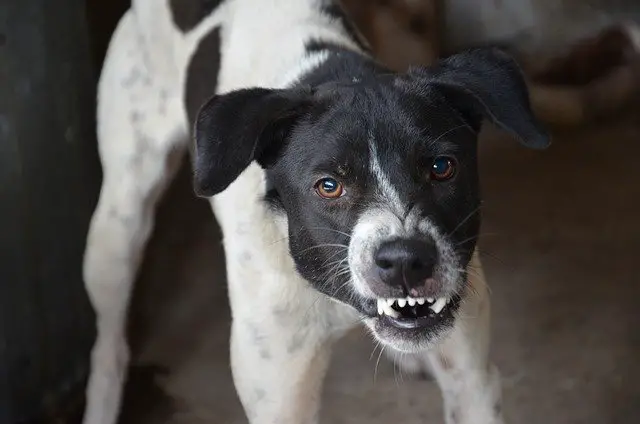
No two dogs are the same. Some dogs get calmer as they age while others tend to get grumpier.
A senior dog that develops health issues like canine cognitive dysfunction could show increased signs of aggression, behavior issues, growling, barking, etc.
Some dogs actually mellow down with age. A puppy might be more aggressive and may quiet down as it transitions into adulthood.
Spaying and neutering can also help curb many forms of aggression, territory marking, excess barking, and other forms of competition between dogs of the same gender.
Why Do Dogs Growl When Playing?
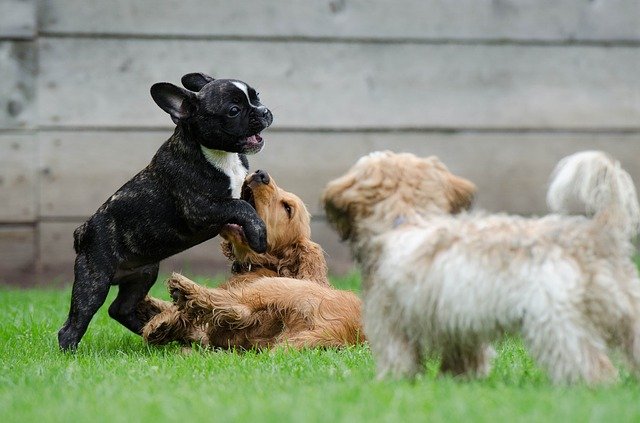
Dogs often growl when playing tug-of-war. This is a normal means of canine communication and, to some extent; it is also healthy for dogs.
Growling while playing is a normal canine instinctual behavior. Puppies do it out of excitement.
However, you must pay attention that the growling does not turn into aggression. If needed, take breaks and calm your pet down. Once it is relaxed, treat it so it understands that not-growling is accepted behavior while growling isn’t accepted.
Is a Dog’s Growling Always Aggression?
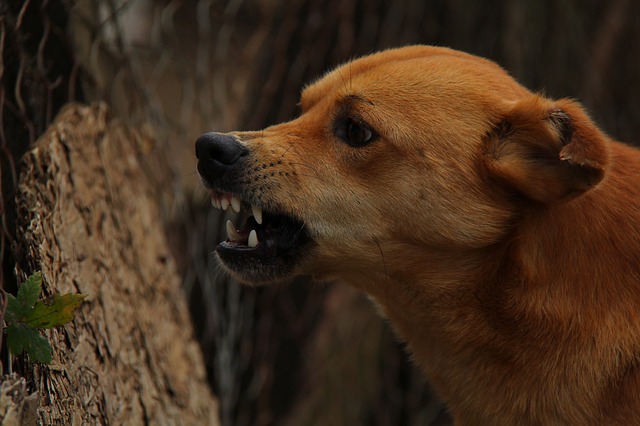
As mentioned above, there are different forms of growling and not all of them depict aggression.
A dog might also play-growl when it is with other dogs or even when it plays with its humans.
Some dogs also growl while being petted. This is a non-aggressive form of growling that depicts attention-seeking behavior.
Also, some dogs growl out of frustration when they want something that is beyond their reach. For example, a fence might stop your dog from chasing a squirrel or when a pet is unable to get treats out of its treat dispenser.
All these forms of growling aren’t aggression.
Should You Growl Back At Your Puppy or Adult Dog?
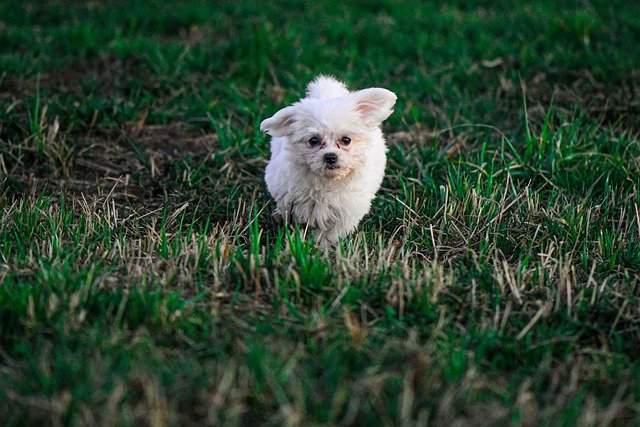
In the past, there were various theories like these used during dog training.
Some of them are considered as utter nonsense today, especially methods like rubbing your dog’s nose in its urine if it voids indoors.
Growling back at your puppy or adult dog is one of these dog training methods that are considered outdated. They do not work due to the following reasons:
- You are unnecessarily putting yourself at risk. The first thing to do is back off. Your dog may not hesitate to lunge at you and even bite you when it growls.
- You growling back might stress your pet even more. Growling is one of the means a dog uses to show it is stressed. So back off, think, and find the solution to minimize your dog’s stress.
- Use the above steps to curb your dog’s growling and if needed, seek the help of a dog trainer or a veterinarian.
Conclusion – Why is My Dog Growling at Nothing?
Dogs growl for a variety of reasons since growling is a means of canine communication.
A dog may not necessarily growl due to aggression. There are different forms of growling: frustrated growling, pleasure growling, etc.
An older dog might growl because of pain, cognitive dysfunction or other health issues. Some dogs growl at nothing because they might actually sense, see, or hear something that we humans can’t.
If your dog’s growling worsens, please seek help.
